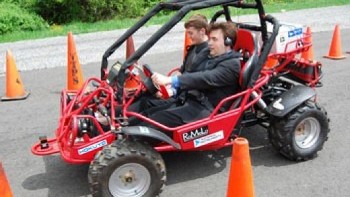Aug 19 2010
In the development of blind access technologies, the National Federation of the Blind proposed an initiative to develop a system capable of providing the blind with the ability to drive. The Virginia Tech Blind Driver Challenge (BDC) was created in response to the proposal of NFI by the students of Virginia Tech.
With the help of the National Instruments Technology, they constructed a semi -autonomous vehicle that allows a blind driver to successfully maneuver by, control speed and avert accidents by a secure driving course.
 Blind Drivable Vehicle
Blind Drivable Vehicle
At NIWeek, a graphical system design conference and exhibition showcasing new developments in virtual instrumentation and commercial technologies in Austin, the Blind Driver Challenge project won the National Instruments' 2010 Graphical System Design Achievement Award. Dr. Dennis Hong, director of the Robotics and Mechanisms Laboratory (RoMeLa) at Virginia Tech's College of Engineering, tendered the paper describing the project along with Greg Jannaman and Kimberly Wenger, two of the undergraduate students who worked under his guidance.
According to Dr. Marc Maurer, President of the National Federation of the Blind, the Blind Driver Challenge project is intended to create a novel non-visual user interface in which the data received from the environs is conveyed to the driver imperceptibly. This enables the blind person to drive safely and independently.
With NFB, the Blind Driver Challenge team is now working with the second-generation prototype vehicle, incorporating new and improved interface technologies into a Ford Hybrid Escape. On January 29, 2011, they have planned to display the vehicle to the public during the pre-race activities at the 2011 Rolex 24 at Daytona.
According to Ray Almgren, vice president of marketing for core platforms at National Instruments, the success of Blind Driver Challenge represents the commitment of National Instruments towards delivering training and technology for students and scientists, thereby improving the quality of life globally.
Source: http://www.nfb.org